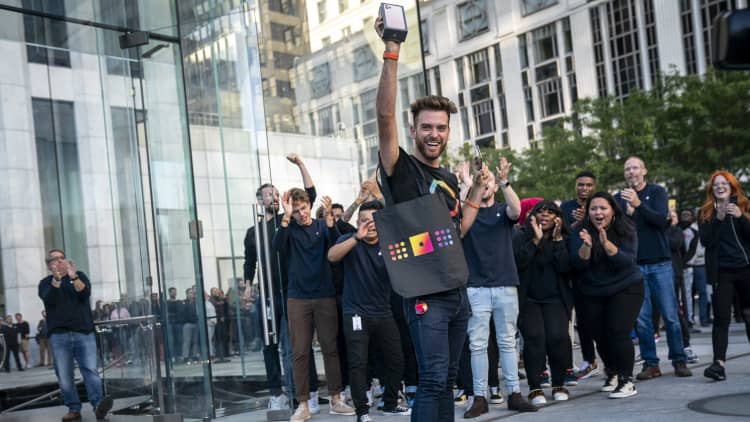Starting next year, Apple will remove apps from its App Store that track users without first receiving permission, a move that promises to bolster iPhone user privacy but will likely shake the app advertising industry.
To target ads and measure how effective they are, app developers and other industry players currently often use an Identifier for Advertisers (IDFA), or a string of letters and numbers that's different on every Apple device.
In an update to the iPhone operating system expected "early next year," app makers will be forced to ask permission to access a user's IDFA through a pop-up. A significant portion of users will likely decide to opt-out, reducing the effectiveness and profitability of targeted ads. The change takes a privacy option that was previously buried in settings and puts it front and center when users open each app.
On Tuesday, Apple's senior vice president of software engineering Craig Federighi said apps that don't comply with the new requirements, which Apple calls App Tracking Transparency (ATT), can be removed from the App Store, which is the only way to install software on an iPhone.
The move pits app developers who make money through targeted ads against Apple, which has increasingly built privacy features into its products as a way to differentiate them from competitors. Critics include Facebook, which said that the change could reduce revenue by 50% in one of its advertising businesses.
"Some in the ad industry are lobbying against these efforts—claiming that ATT will dramatically hurt ad-supported businesses—but we expect that the industry will adapt as it did when we introduced intelligent tracking prevention, providing effective advertising without invasive tracking," Federighi said in a speech at a European privacy conference.
Some examples of tracking that app makers would be required to get permission from the user before doing, according to Apple:
- Displaying targeted advertisements in apps based on user data collected from apps and websites owned by other companies.
- Sharing device location data or email lists with a data broker.
- Sharing a list of emails, advertising IDs, or other IDs with a third-party advertising network that uses the information to retarget those users in other developers' apps or to find similar users.
"Early next year, we'll begin requiring all apps that want to do that to obtain their users' explicit permission, and developers who fail to meet that standard can have their apps taken down from the App Store," Federighi said.
The disclosure that Apple can remove non-compliant apps also raises the stakes for a date expected early next year when app developers will have to explicitly ask permission to use the IDFA to perform tracking, forcing developers to rebuild part of their ad targeting systems to comply with Apple's requirements.
Apple's iPhones account for just over 25% of smartphones around the world, according to StatCounter, but its market share is higher in countries such as the United States. In addition, iPhone users are often wealthier and seen as more valuable customers. If app developers are removed from the App Store, they will lose a major market.
Apple's ATT is the latest in a line of moves that reduces the ability of advertisers to collect data on iPhone users. In 2017, Apple introduced a feature called ITP that used machine learning to block ad trackers on Apple's Safari browser. On Tuesday, Apple started requiring app developers to submit a detailed questionnaire about its privacy practices and the data they and third-party partners collect before being approved on the App Store.
Apple has been criticized on both sides of the IDFA issue. In France, advertising companies and publishers filed a competition complaint in October alleging that the planned move away from the IDFA uses privacy as a cover for anticompetitive conduct to hurt smaller technology companies.
Last month, Apple was also hit by complaints by activists in Europe which claimed that the IDFA — the current system — doesn't comply with European privacy laws.
"We delayed the release of ATT to early next year to give developers the time they indicated they needed to properly update their systems and data practices, but we remain fully committed to ATT and to our expansive approach to privacy protections," Jane Horvath, senior director of privacy at Apple, said in response.
Apple has not publicly said when ATT will go into effect.



